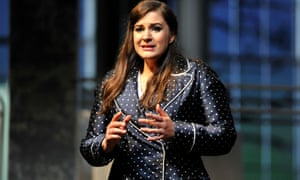Lise Davidsen, ou le déchaînement du calme au milieu de la tempête
Découvrir une voix _ son timbre, son souffle _ peut être merveilleusement jouissif.
…
Ainsi en va-t-il du charme totalement prenant
de la voix de la jeune sopano norvégienne Lise Davidsen,
menée ici par le gant de velours d’Esa-Pekka Salonen
à la tête de l’Orchestre Philharmonia
en un programme Wagner – Richard Strauss
qui déroule somptueusement :
…
il s’agit du CD Decca Lise Davidsen _ Decca 483 4883.
…
…
Voici ce qu’en chronique The Guardian :
…
…
Davidsen: Wagner and Strauss review – powerhouse soprano’s stunning debut
…
Davidsen/Philharmonia/Salonen
(Decca)
…
…
Her voice is the calm at the centre of a storm of music by Wagner and Strauss in Davidsen’s worth-the-wait album
…
…
 ..
..…
…
No emerging soprano has made quite the same stir recently as Lise Davidsen. Here, finally, is her first solo CD. It covers Wagner and Strauss repertoire recorded by many of the greatest voices – and yet several of Davidsen’s versions go straight towards the very top of the playlist.
…
…

…
…
It’s not just the voice – though that is special in itself, gleaming and electric in tone, and buoyed by a seemingly endless supply of breath. It’s also the way she is able to create a still fulcrum even while all Wagner and Strauss’s orchestral manoeuvres churn around her.
…
…
First we hear two big scenes for Elsa, heroine of Wagner’s Tannhäuser, the full-beam excitement she switches on for Dich, Teure Halle turning to dignified resignation in Allmächt’ge Jungfrau. Then it’s Strauss: a powerhouse performance of Es gibt ein Reich from Ariadne auf Naxos, half a dozen orchestral songs, and the Four Last Songs.
…
…
“It’s not my responsibility to interpret. I am just the messenger” says Davidsen of her approach to Strauss, and it serves her well, though some interpretation has certainly gone into her wonderfully dark and dramatic Ruhe, meine Seele. There is, however, perhaps room for a little more individuality if she wants to make the iconic Four Last Songs truly her own – there’s a weightiness to her singing here that means they don’t soar quite as freely as they could.
…
…
It was the Philharmonia that gave the premiere of the Four Last Songs, in 1950. Here, conducted by Esa-Pekka Salonen, they give Davidsen solid support throughout, even if the textures can be murky. The soprano at the 1950 premiere was Davidsen’s fellow Norwegian Kirsten Flagstad. But I’d say a better comparison is with Janet Baker, who said so much by seemingly doing so little, and who would create an awed sense of vulnerability by paring her big voice down to the point where it risked cracking – as Davidsen does here in Strauss’s Morgen !, dancing with heart-stopping delicacy around Zsolt-Tihamér Visontay’s violin solo. The Baker mention alone should tell you how much this disc has been worth the wait.
…
…
Ce lundi 10 juin 2019, Titus Curiosus – Francis Lippa

